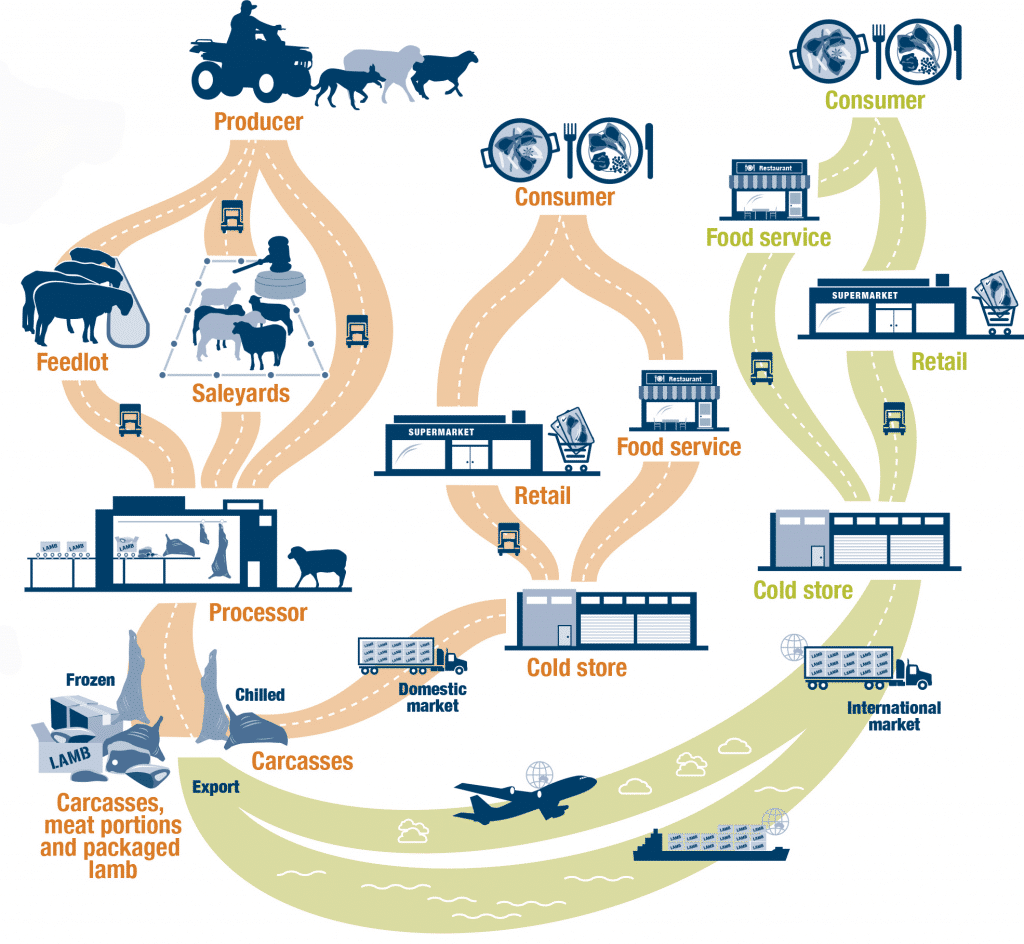By now, you’ve heard the word “blockchain” – probably in connection with Bitcoin but (probably) not with regards to Farm Biosecurity.
In this post, we will look to explore:
- What is Blockchain?
- How it can help with traceability and food provenance
- Relevant industry trends that may impact producers and other parties across the livestock supply chain
Ultimately, blockchain introduces a new way to securely store records in the cloud through a distributed ledger. It ensures that any product (or in our case livestock) is traceable through every point in the supply chain.
At AgriWebb, we know that farmers who comply with the record keeping and traceability requirements of farm accreditation schemes gain access to premium markets. That’s why we provide farm management software that makes compliance through paperless audits a breeze.
The Department of Home Affairs is catching on, and considering leveraging blockchain technology and the data captured by livestock management software to “manage the clearance of goods” in the future.
That means that sound data entry and management at red meat and wool producing operations may soon rely on blockchain technology to streamline compliance with international accreditations.
Back to Basics – Farm Biosecurity
The biosecurity effort by Animal Health Australia (AHA) and the Deptartment of Agriculture and Fisheries is primarily focused on livestock traceability for producers and food provenance. This is all part of an effort to democratise knowledge, and provide control to the consumer so that they know where their food comes from.
There are many other players in the biosecurity effort. Meat and Livestock Australia, the introduction of eNVD, collaboration with TruckSafe for transportation accreditation, and international accreditations all require detailed record keeping.
The burden of technology continues to weigh in, requiring us to innovate faster and integrate across the supply chain. Modern farms are assimilating into the Internet of Things, which makes bringing products to market slightly more complex than the old days of loading them onto a truck.
Australian producers that comply with the requirements of the programs above are known to command higher prices and fill more quotas as demand for Safe Meat increases.
“In Japan, Australia quickly capitalised on the US’s loss and we went from having 50 per cent of the quota to 90pc.”
Dr Jane Weatherley
CEO, Integrity Systems Company (an MLA subsidiary)
What is blockchain, and what can it do?
Blockchain is a shared ledger. It is easy to add records, but not alter them. That is because every transaction is recorded in real time, and remains logged across every device plugged into the supply chain.
What does this look like in practice?
Let’s say an abattoir notices contamination in a lot of meat, which your stock is part of. The abattoir could slam the brakes on further purchases of meat from every single producer while they spend days poring over paper-based records.
Blockchain could help farmers keep products on the market by providing properly validated information. And, it could contribute to fairer prices for producers who are proactive in farm management and record keeping that’s in line with national and state-wide biosecurity standards and accreditations.

Take the case of Sonya Comiskey’s Bazadais beef operation in Central Queensland. Sonya’s Bazadais beef operation is part of a larger 6,000 head herd spread across more than 24,000 hectares.
Like many producers, Sonya is constantly bombarded and intimidated by requests to provide proof that her products reach consumers’ plates in exactly the perfect condition she advertises. As Sonya explained, “People make a lot claims, but being able to back those claims is really important, [especially] without extraordinarily complicated and expensive certification schemes.”
Comiskey believes blockchain is the “way that we can do that,” and she isn’t alone.

AgriWebb Chairman Justin Webb recently acknowledged that, “Agriwebb has the potential to expand its reach, beyond the farms it manages, to the entire supply chain. For instance, through the use of blockchain, logistics companies, distributors and even consumers will be able to identity the provenance of farm produce.”
Today, more than 10% of Australia’s livestock are logged into AgriWebb, and that number is rising with 50-60 new producers joining every month. While Producers can continue to rely on pen and paper for their record keeping, digitised records that are traceable will inspire more confidence among Distributors and Consumers.
Keeping those records continually updated in an accessible format is vital and at some point will become mandatory. Farm management software like as AgriWebb assist producers on a day to day basis with this exact challenge. In time blockchain technology could enable such capabilities across the entire supply chain.
Blockchain in the Livestock Supply Chain Today
Blockchain improves efficiency in many sectors, and major supply chain players are beginning to see that.
FACT: International commerce giant Walmart launched a blockchain pilot program to track Mexican mangoes and Chinese pork.
They found that the blockchain reduced the time required to trace any product from about six days, 18 hours, and 26 minutes to just 2.2 seconds.
Domestic and international buyers are concerned with biosecurity, and your farm’s participation in the blockchain could position it ahead of others who are not forthcoming.
For most farmers, improving direct market access is one of the most exciting reasons to adopt blockchain technology. Several companies are already experimenting with this:
They found that the blockchain reduced the time required to trace any product from about six days, 18 hours, and 26 minutes to just 2.2 seconds.
- Australian firm Full Profile launched AgriDigital, a grain commodity management platform that promises “paddock-to-plate transparency” to consumers while streamlining transactions and storage management for producers
- New Zealand dairy producer Fonterra is working with Alibaba on a Food Trust Framework program that provides end-to-end traceability to consumers in China and other markets, with a goal of improving product safety and consumer confidence
- BlockGrain offers stakeholders in Australian agriculture the ability to “make better-informed decisions, eliminate unnecessary paperwork and dockets, reduce supply chain inefficiency and risk, open markets” and increase profits through a single, simple platform
Harnessing Blockchain for Your Farm
Because technology changes so often, it’s crucial to focus on the basics. Increasing your focus on efficient data entry and record keeping will continue to play a crucial role as these technologies come into play.
The way blockchain is structured cuts straight to the chase. Not only does it cut through many middle-men, but it is extremely difficult to fraudulently modify data, even after transfer from different sources.
That means that blockchain can help you gain access to new markets, and retain that access, because your new supply chain partners and direct markets will be able to easily verify your product claims.
As you prepare for enhanced traceability and greater market access, make sure your records cover inputs, mob movements, and sales.



 Australia
Australia
 New Zealand
New Zealand
 South Africa
South Africa
 United Kingdom
United Kingdom
 United States
United States